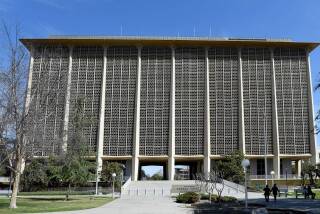Carona loses bid to quash tapes
- Share via
In a significant blow to former Orange County Sheriff Michael S. Carona’s criminal defense team, a federal judge ruled Friday that prosecutors can play secretly recorded conversations between the ex-sheriff and a top aide during Carona’s corruption trial.
In those conversations, Carona and the aide allegedly plotted to cover up illegal cash payments and gifts.
U.S. District Judge Andrew J. Guilford also denied Carona’s motion to dismiss the six felony charges against him, including two witness-tampering counts that accuse Carona of trying to dissuade former Assistant Sheriff Don Haidl from testifying before a grand jury. It was Haidl who recorded the conversations with Carona.
And in a ruling that changes the complexion of the case, Guilford granted Deborah Carona’s motion to be tried separately from her husband, sparing Carona the awkwardness of further courtroom appearances with both his wife and his former mistress, who also is accused in the corruption case.
Deborah Carona wanted a separate trial because she might need to make incriminating statements about her husband to defend herself. That would force her to give up protections that allow a married person to decline to testify against a spouse. If tried after her husband, she could testify without fear of implicating him.
“We appreciate the court’s thoughtful order regarding severance and sincerely hope for a favorable outcome for the co-defendants in the first trial,” said her attorney, David W. Wiechert.
Carona’s lead lawyer, Brian A. Sun, declined to comment on the rulings.
Carona resigned in January to focus on defending himself against charges that he misused the sheriff’s office to enrich himself and others in a conspiracy that included his wife and his former mistress, Debra Hoffman.
All three have pleaded not guilty. A trial date is set for Aug. 26.
Guilford’s long-anticipated ruling on the Haidl recordings is pivotal in that it will allow jurors to hear three conversations in which Carona allegedly incriminates himself.
Carona’s lawyers had argued that it was improper for prosecutors to ask Haidl to secretly tape the conversations last August because they knew Carona was being represented by an attorney at the time.
Guilford found that federal prosecutors “overstepped the boundaries” of State Bar of California rules that prohibit attorneys from contacting parties who are represented by lawyers. But he said their actions were not egregious enough to throw out the tapes as evidence and suggested the State Bar could discipline them if a complaint is filed.
“In this case, where the law governing . . . investigatory contacts is unclear and where less extreme remedies are available, the harm caused by suppression is too high a price to pay,” Guilford wrote in his ruling.
Assistant U.S. Attys. Kenneth Julian and Brett Sagel had said that it was proper for them to send Haidl on the mission, and that top officials at the Justice Department approved of the strategy. They noted that if the Haidl recordings were excluded, it would provide an easy out for anyone: Hire an attorney and then never have to worry about being recorded.
Full transcripts have not been released. But federal prosecutors filed a legal brief citing parts of an obscenity-laced Aug. 13 conversation between Carona and Haidl at the Bayside Restaurant in Newport Beach. Unknown to Carona, Haidl had pleaded guilty to tax evasion charges and was cooperating with prosecutors.
Haidl is a wealthy businessman who used his connections to help bankroll Carona’s 1998 campaign. Carona appointed Haidl assistant sheriff even though he had never worked as a peace officer.
Prosecutors say Haidl gave the Caronas and Hoffman tens of thousands of dollars in cash and gifts and Carona gave him the job of assistant sheriff and other favors in return.
At one point during the Aug. 13 conversation, Carona told Haidl that he would deny receiving cash from him.
“Unless there was a pinhole in your ceiling that evening, it never . . . happened,” Carona said. Prosecutors said “pinhole” meant a hidden camera.
The sheriff went on to say there were no bank records that prosecutors could use to prove the financial exchanges.
“On my end, nothing’s traceable. It’s hidden,” Haidl said.
“Well, on my end of it, completely untraceable, completely untraceable,” Carona replied.
--
christine.hanley@latimes.com stuart.pfeifer@latimes.com
More to Read
Sign up for Essential California
The most important California stories and recommendations in your inbox every morning.
You may occasionally receive promotional content from the Los Angeles Times.











